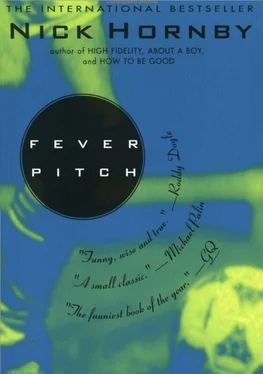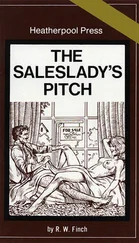As we walked towards the railway station after the game, we saw the man lying in the road, partially covered by a raincoat, a purple-and-blue Palace scarf around his neck. Another younger man was crouched over him, and the two of us crossed the road and went to have a look.
“Is he all right?” Frog asked.
The man shook his head. “No. Dead. I was just walking behind him and he keeled over.”
He looked dead. He was grey and, as far as we were concerned, unimaginably motionless. We were impressed.
Frog sensed a story that would interest not only the fourth year but much of the fifth as well. “Who done him? Scousers?”
At this point the man lost patience. “No. He’s had a heart attack, you little prats. Now fuck off.”
And we did, and that was the end of the incident. But it has never been very far away from me since then, my one and only image of death; it is an image which instructs. The Palace scarf, a banal and homely detail; the timing (after the game, but mid-season), the stranger paying distressed but ultimately detached attention. And, of course, the two idiotic teenagers gawping at a tiny tragedy with unembarrassed fascination, even glee.
It worries me, the prospect of dying in mid-season like that, but of course, in all probability I will die sometime between August and May. We have the naive expectation that when we go, we won’t be leaving any loose ends lying around: we will have made our peace with our children, left them happy and stable, and we will have achieved more or less everything that we wanted to with our lives. It’s all nonsense, of course, and football fans contemplating their own mortality know that it is all nonsense. There will be hundreds of loose ends. Maybe we will die the night before our team appears at Wembley, or the day after a European Cup first-leg match, or in the middle of a promotion campaign or a relegation battle, and there is every prospect, according to many theories about the afterlife, that we will not be able to discover the eventual outcome. The whole point about death, metaphorically speaking, is that it is almost bound to occur before the major trophies have been awarded. The man lying on the pavement would not, as Frog observed on the way home, discover whether Palace stayed up or not that season; nor that they would continue to bob up and down between the divisions over the next twenty years, that they would change their colours half a dozen times, that they would eventually reach their first FA Cup Final, or that they would end up running around with the legend “VIRGIN” plastered all over their shirts. That’s life, though.
I do not wish to die in mid-season but, on the other hand, I am one of those who would, I think, be happy to have my ashes scattered over the Highbury pitch (although I understand that there are restrictions: too many widows contact the club, and there are fears that the turf would not respond kindly to the contents of urn after urn). It would be nice to think that I could hang around inside the stadium in some form, and watch the first team one Saturday, the reserves the next; I would like to feel that my children and grandchildren will be Arsenal fans and that I could watch with them. It doesn’t seem a bad way to spend eternity, and certainly I’d rather be sprinkled over the East Stand than dumped into the Atlantic or left up some mountain.
I don’t want to die immediately after a game, though (like Jock Stein, who died seconds after Scotland beat Wales to qualify for the World Cup, or like a friend’s father, who died at a Celtic-Rangers game a few years ago). It seems excessive , somehow, as if football were the only fitting context for the death of a football fan. (And I’m not talking about the deaths of Heysel or Hillsborough or Ibrox or Bradford here, of course; those were tragedies of a different order altogether.) I don’t want to be remembered with a shake of the head and a fond smile intended to imply that this is the way I would have chosen to go out if I could; give me gravitas over cheap congruence any time.
So let’s get this straight. I don’t want to peg out in Gillespie Road after a game because I might be remembered as a crank; and yet, crankily, I want to float around Highbury as a ghost watching reserve games for the rest of time. And in a sense these two desires—at first glance incomprehensibly inconsistent, I would imagine, to those without equivalent fixations—characterise obsessives and encapsulate their dilemma. We hate being patronised (there are some people who know me only as a monomaniac, and who ask me slowly and patiently, in words of one syllable, about Arsenal results before turning to someone else to talk about life—as if being a football fan precludes the possibility of possessing a family or a job or an opinion on alternative medicine), but our lunacy makes condescension almost inevitable. I know all this, and I still want to lumber my son with the names Liam Charles George Michael Thomas. I get what I deserve, I guess.
ARSENAL v IPSWICH
14.10.72
By the time I was fifteen I was no longer quite so small—indeed, there were now a number of boys in my year smaller than me. This was a relief in most ways, but brought with it a problem that gnawed at me constantly for some weeks: I could no longer, if I was to maintain any self-respect, postpone my transfer from the Schoolboys’ Enclosure to the North Bank, the covered terrace behind one of the goals where Arsenal’s most vocal supporters stood.
I had plotted my début with great care. For much of that season I’d spent more time staring at the alarming lump of noisy humanity to my right than straight ahead at the pitch; I was trying to work out exactly where I would make for and what parts I should avoid. The Ipswich game looked like my ideal opportunity: Ipswich fans were hardly likely to attempt to “take” the North Bank, and the crowd wouldn’t be much more than thirty thousand, about half the capacity. I was ready to leave the Schoolboys behind.
It is difficult to recall now exactly what concerned me. After all, when I travelled up to Derby or Villa I usually stood in the away end, which was simply a displaced North Bank, so it couldn’t have been the prospect of trouble (always more likely at away games or at the other end of Arsenal’s ground), or fear of the type of people I would be standing with. I rather suspect that I was frightened of being revealed, as I had been at Reading earlier on that year. Supposing the people around me found out I wasn’t from Islington? Supposing I was exposed as a suburban interloper who went to a grammar school and was studying for Latin O-level? In the end I had to take the risk. If, as seemed probable, I provoked the entire terrace into a deafening chant of “HORNBY IS A WANKER” or “WE ALL HATE SWOTS, HATE SWOTS, HATE SWOTS” to the tune of the “Dambusters’ March”, then so be it; at least I would have tried.
I arrived on the terrace shortly after two o’clock. It seemed enormous, bigger even than it had looked from my usual position: a vast expanse of steep grey steps over which had been sprinkled a complex even pattern of metal crush barriers. The position I had decided on—dead centre, half-way down—indicated both a certain amount of gung-ho (the noise at most football grounds begins in the centre of the home terrace and radiates outwards; the sides and the seats only join in at moments of high excitement) and a degree of caution (centre back was not a place for the faint-hearted débutant).
Rites of passage are more commonly found in literary novels, or mainstream Hollywood films with pretensions, than they are in real life, particularly in real suburban life. All the things that were supposed to change me—first kiss, loss of virginity, first fight, first drink, first drugs—just seemed to happen ; there was no will involved, and certainly no painful decision-making process (peer-group pressure, bad temper and the comparative sexual precocity of the female teenager made all the decisions for me), and perhaps as a consequence I emerged from all these formative experiences completely unformed. Walking through the North Bank turnstile was the only time I can remember consciously grasping a nettle until I was in my mid-twenties (really—this is not the place to go through all the nettles I should have grasped by then, but I know I didn’t bother): I wanted to do it, but at the same time I was, pathetically, a little afraid. My only rite of passage, then, involved standing on one piece of concrete as opposed to another; but the fact that I had made myself do something that I only half-wanted to do, and that it all turned out OK … this was important to me.
Читать дальше











